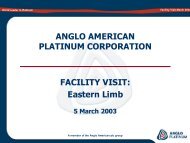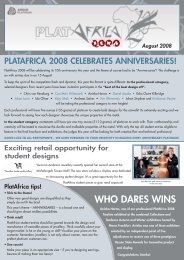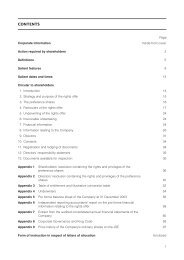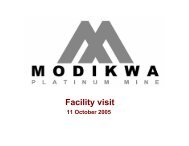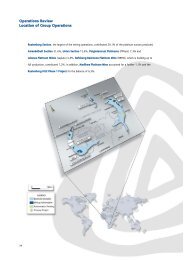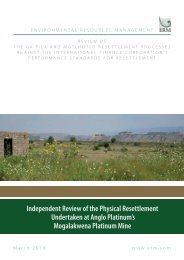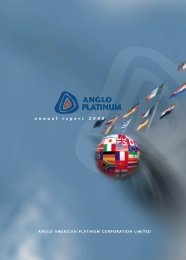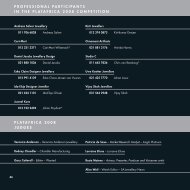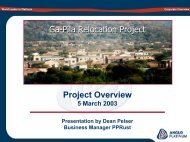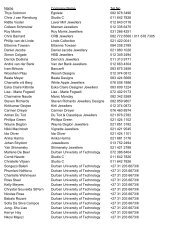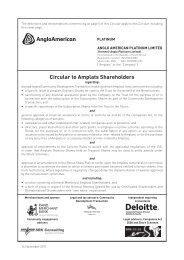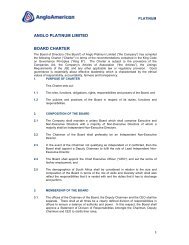[PDF] Mogalakwena Mine - Anglo Platinum
[PDF] Mogalakwena Mine - Anglo Platinum
[PDF] Mogalakwena Mine - Anglo Platinum
Create successful ePaper yourself
Turn your PDF publications into a flip-book with our unique Google optimized e-Paper software.
GeneralupdateoncommunityisuesNovember2009
This report provides <strong>Anglo</strong> <strong>Platinum</strong>’s stakeholders with an update on issues pertinent to the:• resettlement at <strong>Mogalakwena</strong> mine;• alleged impact on water quality in Ga-Molekana community; and• company’s response to the South African Human Rights Commission’s (SAHRC) recommendationsthat were included in a report released by the SAHRC entitled ‘Mining-related observations andrecommendations: <strong>Anglo</strong> <strong>Platinum</strong>, affected communities and other stakeholders in and around thePPL <strong>Mine</strong>, Limpopo’.The report is structured so as to provide:• background information about <strong>Mogalakwena</strong> mine;• history of the resettlement and what the current status is, including how the SAHRC’srecommendations have been addressed;• summary of the findings of the geo-hydrological investigations into the alleged watercontamination at Ga-Molekana village; and• complete update of the broader SAHRC recommendations that were not directly applicable tothe resettlement.ANGLO PLATINUM MOGALAKWENA MINE 20091
MOGALAKWENA MINE<strong>Mogalakwena</strong> mine (formally PPL mine) is located 20 km northwest of the town of Mokopane andfalls within the Limpopo Province’s Waterberg District (DC36) and <strong>Mogalakwena</strong> Local Municipalities(one of six local municipalities that make up the district). Adjacent local municipalities includeAganang, Polokwane and Lepele-Nkumpi municipalities. The estimated population in themunicipality, which is made up of 31 wards, is 300 000 people with an unemployment rate of 48%.The current mine opened in 1991. However, mining by the company Potgietersrust <strong>Platinum</strong> Limitedfirst commenced in 1926 on the property Vaalkop and ceased four years later in 1930.<strong>Anglo</strong> <strong>Platinum</strong> and its wholly owned subsidiaries hold the mining right over the area shown onpage three.Regional map showing the locality of <strong>Mogalakwena</strong> mine2 ANGLO PLATINUM MOGALAK WENA MINE 2 0 0 9
Mining right area and location of open pits at <strong>Mogalakwena</strong> mineCommunities within the <strong>Mogalakwena</strong> mining rights areaAlthough <strong>Anglo</strong> <strong>Platinum</strong> holds the mining right over the area shown above left, it does not own thesurface rights. The surface rights belong to the Mapela and Langa traditional authorities and are heldin Trust by the state on behalf these authorities. Many communities live on the land within, orimmediately adjacent to, the mining right area as shown in the map above right.Farm nameOwnerPortion of Sandsloot 236 KRState on behalf of Mapela traditional communityPortion of Vaalkop 819 LRState on behalf of Langa traditional communityPortion of Zwartfontein 818 LRKgoshigadi holds the land in TrustPortion of Overysel 815 LRState on behalf of Langa traditional communityPortion of Vaalkop 819LRState on behalf of Mapela traditional communityPortion of Blinkwater 244KRState on behalf of Mapela traditional communityIn order for the mine to gain access to the ore body, secure land for mining infrastructure andprevent safety and environmental impacts affecting the community, <strong>Anglo</strong> <strong>Platinum</strong> was required torelocate the Ga-Sekhaolela and Ga-Puka communities (collectively known as Motlhotlo). The nextsection of this report provides a background to the resettlement and provides an update of thecurrent status of various issues surrounding the resettlement process.ANGLO PLATINUM MOGALAK WENA MINE 2 0 0 93
MOTLHOTLO RESETTLEMENTSUMMARY OVERVIEW OF THE RESETTLEMENTThe list below provides a summary overview of what the Motlhotlo resettlement project has entailedand what <strong>Anglo</strong> <strong>Platinum</strong> has provided for as a means of setting the context for this document:• extensive consultation with the affected communities (see page 6);• the resettlement initiated with 100% homeowner sign-off in the form of one-on-one agreements;• development of bulk and reticulated infrastructure in the new village in line with the Departmentof Water Affairs and Forestry’s ‘Water supply design guidelines’, Eskom’s electrification standardsand specifications and the requirements of the municipal engineers. Infrastructure includedbulk/raw water, water supply reticulation, sanitation and solid waste, roads and storm waterdrains, structural design of house foundations, electrical distribution and reticulation andelectrical services for buildings;• the replacement principle was based on a ‘like-for like’ basis. As a minimum, however in mostinstances the replacement or compensation was a substantial improvement;• two asset audits were done in the old villages to accurately determine what assets the individualhouseholds had, one in May 2002 and another September 2002 to do a final verification;• development of 956 new houses to a minimum standard specified in the Department ofHousing’s ‘Guidelines for Human Settlement, Planning and Design’;• 25 community members were employed and trained as architectural assistance to assist in theprocess of explaining and signing off of home owner’s packages;• development of 61 other structures such as shops, schools and a clinic;New Motlhotlo village4 ANGLO PLATINUM MOGALAKWENA MINE 2009
• compensation for loss of surface access to farmers;• relocations of some 2,300 graves;• financial compensation for immovable assets e.g. fruit trees;• payment of R20 000 settling-in allowance per household was paid post relocation;• a ‘land for land’ exchange and the donation of additional farms;• development of 700 hectares of maize fields for use by the community;• a brick making plant donated to community;• R50 million will be contributed into two community trust funds (R25 million) per community overa period of 10 years;• 30% of the new workforce should come from these affected communities;• Throughout the project, <strong>Anglo</strong> <strong>Platinum</strong> paid for expenses incurred by the community as a result of theresettlement including the community’s legal advisors fees; and stipends to the trustees of the Section 21companies, operational teams and the community liaison officers;• the company is to provide cost assistance for municipal services over a 3-year period diminishing from100% to 70% to 50% before final hand over of services.• the amount budget for the project was R675 million in nominal terms; and spent to date closer toR800 million• all construction on the new villages was completed March 2009.ANGLO PLATINUM MOGALAKWENA MINE 20095
STAKEHOLDER CONSULTATION PROCESSESThe resettlement consultation process which took place prior to the approval of the resettlement issummarized in the bulleted list below. This list represents the key consultations and clearly therewere many more engagements that happened leading to these milestone engagements.PRIOR TO PROJECT APPROVAL• Initial contact with the communityCommittees.resettlement.Old village6 ANGLO PLATINUM MOGALAKWENA MINE 2009– During 1998 <strong>Anglo</strong> <strong>Platinum</strong> consulted the communities about the mine’s expansion andpossible need for resettlement. It was at this stage that the community formed the Relocation– March 2002 The company appointed a team of specialists e.g. environmental and social todo impact assessments and engaged with the Relocation Committees.– May 2002 Community meetings were held between the team of specialists, the Limpopoprovince Premier’s office, municipality and company representatives to discuss the– End 2003 Governance and communication training was provided to the Section 21companies that had been formed (See Agreements with community leadership below)• Site selection process with community leadership– May 2002 Community meetings with specialist team and relocation committees to agree onthe preferred site location for the new village out of four options.• Consultation with the community during environmental impact assessment process– September 2002 Public participation meetings and key stakeholder workshops were held.– 2nd half 2002 Social impact assessment process required 12 focus group discussions to hearfirst hand the issues and to consult the community.• Community resolutions with individual home owners– October 2002 Land rights holders’ community resolution signed off.– July 2005 Relocation and donation agreements signed off.
KEY APPROVALSDuring the project planning phase a number of key approvals were obtained from the communityleadership and government. These are summarized below.AGREEMENTS WITH COMMUNITY LEADERSHIP<strong>Anglo</strong> <strong>Platinum</strong> reached agreement with the community leadership on key issues as follows:• 1999 Ga-Puka relocation committee established and a legal representative appointed by thecommunity.• 2001 Ga-Sekhaolelo relocation committee established and a legal representative appointed.• 2002 Both relocation committees were formalized into Section 21 companies under theguidance of their legal representative. More details of why the Section 21 companies wereformed are provided in the text box.• May and September 2002 Asset audits sign-off by homeowners, headman, two communityrepresentatives and the surveyors.• October 2002 Land rights holder’s community resolution signed off following agreement withtraditional authority council and headman for each village.Signing of agreements with the community in 2005• May 2004 The town planning layout plans were signed by community leaders• June 2004 The process of obtaining individual homeowner sign off commenced• July 2005 Relocation and donation agreements signed off between <strong>Anglo</strong> <strong>Platinum</strong> and thecommunity.• July 2007 Task team gave approval for resettlement to commence (see detail on page 14).ANGLO PLATINUM MOGALAKWENA MINE 20097
STAKEHOLDER CONSULTATION PROCESSES continuedFACTS ABOUT THE SECTION 21 COMPANIESThe two Section 21 companies set up for the relocation by the communities operate as independententities, with a set of Memorandum and Articles of Association. The members of the Section 21 Companiesappointed the initial Directors of the Section 21 Companies. The members may also appoint/removeDirectors at a general meeting.Any adult can become a member of the Section 21 Companies. The community members have similarrights to those of ordinary shareholders in an ordinary company with respect to the Board of Directors. Thecommunity is entitled to understand and assert its legal rights throughout the resettlement process andthat is why the community had access to an independent legal advisor when the community relocationsteering committees were first established in October 1998 and subsequently through to the establishmentof Section 21 Companies. <strong>Anglo</strong> <strong>Platinum</strong> took a principled position to pay for all costs of consultantsrequired by the community on all issues arising out of the relocation process. This includes legal consultants,environmental experts as well as blasting consultants. Members of the Section 21 companies received astipend.AGREEMENTS AND APPROVALS FROM GOVERNMENT<strong>Anglo</strong> <strong>Platinum</strong> reached agreement with various government departments and agencies ondifferent aspects of the resettlement as follows:• October 2002 The Department of Land Affairs facilitated and oversaw the process of signing offon the land holders’ resolutions.• August 2003 The environmental impact assessment and management plan was submitted tothe Department of Finance and Economic Development (DFED) of Limpopo province forapproval following public and governmental stakeholder consultation and impact assessments.• March 2004 The DFED issued a positive record of decision on the scoping and EIA reports.• July 2004 The Department of Local Government and Housing approved the land use changeapplication made under the Development Facilitation Act.• July 2004 Following extensive consultation between the municipality and the Section 21companies, the service agreements were signed off by the Section 21 companies and<strong>Mogalakwena</strong> Municipality.• September 2005 Municipal engineers signed off on design and construction criteria for the newvillage.• August 2008 Construction of new village completed.8 ANGLO PLATINUM MOGALAKWENA MINE 2009
The list of key steps in the consultation processes listed above shows the extensiveness ofconsultation process followed for the resettlement. The construction of the new villages commencedin August 2005 once all the approvals listed above had been obtained from both the governmentand community.CONSULTATION DURING THE PHYSICAL RESETTLEMENTA number of consultation and grievance processes were put in place for the physical resettlementphase and these are summarized as follows:• Project executive committee established A project executive committee was established asthe highest level oversight body to review all aspects of the resettlement project. This committeemet fortnightly and the community was represented on the executive committee through theirlegal advisors.• Community kgoros Regular (weekly) updates of progress and issues were provided by theproject team at meetings held by the community (kgoros). These typically took place onweekends.• Community liaison officers Four community members were employed and trained ascommunity liaison officers to ensure effective liaison with the households. The communityliaison officers are the first point of contact for the homeowners to lodge complaints and disputes.• Operational teams 14 community members were employed on the operational teams to assistthe logistics of the resettlement e.g. scheduling moves and ensuring the removal trucks arrived atthe correct house on time, to name but two examples.• Task team A task team was established in June 2007 and included members from the MotlhotloDevelopment Committee, the relevant Section 21 companies and various government andnon-government bodies under the leadership of the Limpopo Premier’s office. This task teamresolved issues that were preventing the start of the resettlement in May/June 2007. These issueswere resolved by July and the resettlement commenced.Community kgoro update on the resettlementANGLO PLATINUM MOGALAKWENA MINE 20099
COMPENSATION TERMS AND PAYMENTSCOMPENSATIONOver and above the improved modern housing, each household received R20 000 compensation asa settling in allowance. In addition compensation was paid for non-movable assets from the oldproperty, for example, fruit trees and incomplete buildings. These non-removable assets werevalued by a professional evaluator and compensation paid out according to these evaluations,which included a value for future benefits. Families were paid an amount of R1 500 per grave for awake fee as part of the grave relocation process.In addition to this, land was compensated for through a ‘land for land’ exchange to ensure individualshad the same access to land. Over and above the two resettlement farms, two substantialcommercially viable farms have been set aside for the community. These farms are some distance,approximately 20 kilometers from the area the community chose for the new villages.<strong>Anglo</strong> <strong>Platinum</strong> has also set R50 million aside in a trust for the Ga-Puka and Ga-Sekhaolelocommunities to use for socio-economic projects in their area. This amount is structured as follows,an upfront payment of R10 million on completion of relocation (vacant occupation) plus R2 millionto each of the two communities per year over a 10-year period.New house in Ga-PukaOld houses in Ga-Puka10 ANGLO PLATINUM MOGALAKWENA MINE 2009
INFRASTRUCTUREThe replacement principle used was based on a ‘like-for like’ basis as a minimum when it came toinfrastructure. This table provides a breakdown of infrastructure.DescriptionGa-PukaGa-SekhaoleloTotalResidential Stands495461956Church6410Crèche112Community Office213Clinic1 Shared1Business91221Primary School112Senior Primary School1 Shared1Secondary School1 Shared1Burial Society Building4913Municipal Office1 Shared1Graveyard112Waste Sites112Total5224931015New clinic in Ga-PukaANGLO PLATINUM MOGALAKWENA MINE 200911
COMPENSATION TERMS AND PAYMENT continuedCornelius Masebe Senior Primary School – old and newKids at play in the new village12 ANGLO PLATINUM MOGALAKWENA MINE 2009
Design criteriaJacob-PukaPrimaryJan MalebanaPrimaryCornelius MasebeSenior PrimaryMphunyeSecondaryOldNewOldNewOldNewOldNewNumber of pupils306306285285402402500500Number of classrooms686816161522Number of pupils per classroom5138483625253323Number of teachers666615152020Area of admin/lab block (m²)OfficesStaff roomReceptionComputer roomStore roomsScience lab———————18031112————————18031112————————18031112————————288411131Perimeter security fence (m)298797—803294878286878Sports ground – netball field11111122Sports ground – soccer field11111111Sports ground – rugby field———————1Sports ground – cricket field———————1Water supplyYesYesYesYesYesYesYesYesPupil toilets (ratio of 1:20)—15—15—20—25Staff toilets—4—4—4—4LocationGa-PukaGa-SekhaoleloShared byboth villagesShared byboth villagesPlaying netballANGLO PLATINUM MOGALAKWENA MINE 200913
RESETTLEMENT PROGRESS AND CURRENT STATUSSUMMARY UPDATE OF OVERALL STATUS OF THERESETTLEMENTThe relocation initially started on 29 May 2007 once the new houses were completed. However, afaction led by the Motlhotlo Development Committee (MDC) blocked public roads with stones anda group of protestors. This prevented people from leaving or entering the village by vehicle –including those who wanted to go to work, school, as well as those who wished to relocate on thatday. The police were called by members of the community who felt intimidated and restricted bythis action. The police deemed this action to be unlawful.When police proceeded into the village to unblock the roads they were assaulted by protestors whothrew stones at them. The police responded to this violence by firing rubber bullets which led to theunfortunate injuries being sustained by some protesters. <strong>Anglo</strong> <strong>Platinum</strong> certainly does not supportunprovoked or unwarranted and disproportionate police action. So as not to escalate the situationon the ground the police got agreement from all parties that the relocation would be suspendedand that all parties would come to the table to discuss their differences. This was done and led to theformation of a Task Team which included members from the MDC, the relevant Section 21 companyand various government and non-government bodies under the leadership of the Premier’s Office.The Task Team investigated various recorded grievances from the MDC, and once sufficient progresswas deemed to have been made, the full Task Team, gave the go-ahead for voluntary relocation tocommence on 11 July 2007.Summary status of the resettlement as at mid September 2009AspectProgressDevelopment of new village at Motlhotlo on the farms Armoede and RooibokfonteinDevelopment and hand over of bulk and reticulated services (development completed, but handover not completed)Houses built to governed standards, floor area rounded up to next 5m2R20 000 compensation paid to each homeowner who has movedCompensation payments made for areas inefficienciesCompensation payments made for incomplete structures and associated immovable assetsTwo farms to be donated to communities (on completion of resettlement)Compensation for ‘wake fee’ for grave relocation – R1 500 per graveR50 million committed by <strong>Anglo</strong> <strong>Platinum</strong> to the Ga-Puka and Ga-Sekhaolelo. Includes an upfront payment of R10 million oncompletion of relocation (vacant occupation) plus R2 million to each of the two communities per year over a 10-year period(will be done on vacant occupation)Twenty four student bursaries for tertiary studies30% preferential employment opportunities provided to affected communities (new mine still ramping up)CompletedIn progress14 ANGLO PLATINUM MOGALAKWENA MINE 2009
To date (mid September 2009) 890 homeowners have relocated (93%), 458 from Ga-Sekhaolelo(99%) and 432 from Ga-Puka (87%). The remaining 13 % of residents at Ga-Puka are against theresettlement and are being represented through the Motlhotlo Relocation Resistance Committee(MRRC). Their main grievances and list of demands are summarized below:• the ‘agreements’ under which the resettlement has been undertaken be renegotiated to include;– An equity stake in the mine;– more compensation for reviewed loss of land; and– would like preferential employment at the mine.• disbanding of current engagement structures so that they can be formally recognized and newstructures elected;• an independent audit to be done on the socio-economic impact of mining activities;• an audit be done of the Section 21 companies and traditional authorities;• detailed disclosure of <strong>Anglo</strong> <strong>Platinum</strong>’s social and labour plans; and• additional compensation for loss of ploughing fields as well as supply of fodder and adequatewater;• guaranteed transportation of their children remaining in the old village to the new schools;• a public apology from <strong>Anglo</strong> <strong>Platinum</strong> for harm caused by the resettlement and the mine; and• all mining activities to be halted until a new agreement is reached.MDC, which was the initial faction in the community opposed to the resettlement and is still activeand continues to demand the following:• to be formally recognized by the project and wants to be allocated offices;• incorporated into all decision making processes;• requires employment specifically for MDC members;• replacement of the Enviroloo sanitation system in use in the new villages;• election of the post relocation management committee; and• wants all activities halted until the Minister of Mining returns to the area.ANGLO PLATINUM MOGALAKWENA MINE 200915
RESET TLEMENT PROGRESS AND CURRENT STATUScontinuedSUMMARY UPDATE ON PROGRESS IN ADDRESSING THE SAHRC RECOMMENDATIONSThe South African Human Rights Commission (SAHRC) made a number of recommendations in their report entitled “Mining-related observations andrecommendations: <strong>Anglo</strong> <strong>Platinum</strong>, affected communities and other stakeholders in and around the PPL <strong>Mine</strong>, Limpopo” released in November 2008 thatare relevant specifically to the resettlement. The table below provides a summary update of what <strong>Anglo</strong> <strong>Platinum</strong> is doing to address the recommendations.SAHRC Recommendation Current Status – September 2009 StatusWATER• A bilateral engagement is developed between PPL and the<strong>Mogalakwena</strong> Municipality to ensure the continued accessto water for all communities, both those that have relocatedand those that are resisting relocation. Access to water mustnot depend on the community decision to relocate.• Water continues to be supplied by the Company to the 66families that are refusing to relocate, on a daily basis and theschedule is known.• PPL engage with the <strong>Mogalakwena</strong> Municipality to betterunderstand their ability to undertake the services providedfor under the relevant Service Level Agreements.• There have been extensive on going engagements withthe municipality in this regard, including meetings withthe Municipality with the Acting Municipal Manager, theTechnical Manager, the Water & Waste head, and the Roadsand Storm water head. At these meetings that the aim wasto advance the issue of handover of services by addressingissues including, resolution of the main access road defect,the Enviroloo problem, and water to the old MotlhotloVillage. At the earlier meetings the municipal officialsindicated that their Portfolio Committee had decided thatthey should not take over services partially, and rather waituntil the road and Enviroloo problems have been resolved.They then undertook to potentially take handover oncethe road defect issue has been fixed and they have agreedwith the course of action for the Enviroloos – eithercontained or uncontained “VIP” pit toilets. In the meantimethe Company’s project team is continuing to maintain andrun the village at its expense.Furtheractionneeded• At the most recent meeting with the municipality on2 September 2009 it was agreed that <strong>Anglo</strong> <strong>Platinum</strong> couldinstall contained/lined VIP pit latrines to replace theEnviroloos. The municipality are however insisting that<strong>Anglo</strong> <strong>Platinum</strong> commit to installing a water-borne agesystem in future when additional water is brought to thearea. This issue remains a point of dispute as it is thecompany’s view that this is a municipal function. The nexthandover meeting is scheduled for the latter part ofOctober.• The water deliveries be made regularly and reliably and bemade known to communities so that their own individualwater usage can be planned and self regulated. This is notonly necessary but also empowering.• See first bullet above under Water – Current Status.CompletedIn progress16 ANGLO PLATINUM MOGALAK WENA MINE 2 0 0 9
SAHRC Recommendation Current Status – September 2009 StatusSANITATION• PPL continues to make the process as participatory aspossible and keeps affected members of the communityupdated on all stages of the development process.• Engagement with all stakeholders in the area has been ongoing since the release of the SAHRC report and records ofthese engagements are kept on file as part of the Company’sweekly project reports.A processin place• In addition, ERM (global consultancy firm) have beencommissioned to conduct a post resettlement reviewto amongst other things identify socio-economicopportunities. A report detailing the findings will becompleted later in the year. The report will be made publicto all stakeholders.• Affected community members continue to report sanitationproblems to PPL and take steps to learn how to use sanitationsystems to ensure that they function effectively.• There have been extensive consultations around thesanitation issues and the “Enviroloo” problems remainongoing. The preferred solution is the RDP VIP pit toiletsand agreement is now needed from DWAF and themunicipality before conversion commences.Furtheractionneeded• The <strong>Mogalakwena</strong> Municipality be engaged by PPL wherethe choice of sanitary system impacts upon the serviceswhich are required to be delivered by the Municipality and inorder to determine the compatibility of the chosen systemwith municipal systems as well as the capacity of theMunicipality to carry out the services requested.• Engagement with the municipality on this issue has beenon going. <strong>Anglo</strong> <strong>Platinum</strong> has met with DWAF ChiefDirector: Mr Alson Matukane, Waterberg District ExecutiveMayor: Erick Gwangwa, Premier: Cassel Mathale,<strong>Mogalakwena</strong> Municipal Mayor: Mr Bob Mmola. Also at themeetings have been the Municipalities’ Mr Phillip Mashotjawho assisted in implementing the RDP VIP toilets at newMotlhotlo for the 32 Host Community households. Asmentioned earlier, at the most recent meeting with themunicipality on 2/9/2009 it was agreed that <strong>Anglo</strong> <strong>Platinum</strong>could install contained/lined VIP pit latrines to replace theEnviroloos. The municipality are however insisting that<strong>Anglo</strong> <strong>Platinum</strong> commit to installing a water-borne sewagesystem in future when additional water is brought to thearea. This issue remains a point of dispute as it is thecompany’s view that this is a municipal function.FurtheractionneededANGLO PLATINUM MOGALAKWENA MINE 200917
RESETTLEMENT PROGRESS AND CURRENT STATUS continuedSAHRC Recommendation Current Status – September 2009 StatusGRAVE REMOVALS• In addition to the list of all graves relocated from theSekuruwe area already provided to the SAHRC, that theaccompanying consent forms signed by the next-of-kin ormandated representatives of those next-of-kin also beprovided.• The community members of Sekuruwe present to PPL andSAHRA a list of graves which it believes to have been movedwithout consent.• PPL engage with civil society organisations defending theinterests of the community over this issue.• PPL audit the practices of its appointed undertaker.• The Company commissioned an extensive review of theSekuruwe grave relocation process, which included the fullinvolvement of SAHRA.• Following <strong>Anglo</strong> <strong>Platinum</strong>’s appointment onto the project ofSAHRA’s recommended forensic anthropologist, ProfessorMarina Steyn of University of Pretoria, SAHRA immediatelyissued (26 May 2009) the necessary permits for remedialwork to continue on the 20 Sekuruwe-Blinkwater-SAHRAgraves. Work commenced on site on 28 May 2009.• On 19 June 2009 – <strong>Anglo</strong> <strong>Platinum</strong> in conjunction withstakeholders put together a draft plan for rollout of theremedial works to all 149 Blinkwater gravesFurtheractionneeded• PPL consult sufficiently with the broader Sekuruwecommunity to more accurately determine the ages of thegraves• Further information be provided by PPL concerning theprecise nature of consultation between PPL and the affectedcommunities relating to the removal of graves.• On 20 June 2009, representatives from SAHRA met with theSekuruwe and surrounding communities to discuss the wayforward with regard all the Blinkwater graves. <strong>Anglo</strong> <strong>Platinum</strong>committed to assess any issues with all 149 graves.• In July, premier and municipal approvals were obtained forthe rollout of the remedial works to all graves.• It be determined what processes are undertaken by <strong>Anglo</strong><strong>Platinum</strong> or their subcontractors to ascertain the heritagestatus of graves.• On 13 July 2009, remedial works on the remaining 129Blinkwater farm graves continued and is still currently ongoing.• It be determined whether communities were informed by<strong>Anglo</strong> <strong>Platinum</strong> or their subcontractors of any right to refuseconsent to grave removal.• Grave sites be accurately mapped and removed gravesaccurately identified.• PPL continue to cooperate fully with SAHRA in any futureenquires in this regard and communicate this openly to thecommunity.• PPL engage with the community at Ga-Tshaba to betterexplain by what processes graves were relocated.18 ANGLO PLATINUM MOGALAKWENA MINE 2009
SAHRC Recommendation Current Status – September 2009 StatusAGRICULTURAL LAND AND FOOD SECURITY• The issue of access to agricultural land be recognised withinthe context of subsistence farming and food security as wellas being part of the culture of the affected communities.• This was recognised as part of the EIA process and correctivemeasures were taken by the Company and compensationpaid accordingly as per the recommendations of Golderand Associates.• At the time of consultation with affected communities, thatit be more clearly and properly explained that there will ormay be the possibility of a time delay between PPL’sappropriation of agricultural land for mining purposes andthe provision to communities of replacement agriculturalland. This includes not only the provision of compensation,but the determination of the impact on food security of theaffected communities given the traditional and partialreliance on subsistence farming and limited access tocommercial food sources.• This recommendation relates to possible futureresettlements and will be implemented.• Taking into account the traditional and partial reliance onsubsistence farming and the nature of traditional communalliving, that <strong>Anglo</strong> <strong>Platinum</strong> more broadly consider adherenceto IFC Performance Standard 5 which requires thecompensation of economically displaced persons who donot have legally recognizable claims to land.• The IFC standards have been reviewed and will beintegrated into all future resettlement planning andimplementation processes. The IFC standards were notpublished at the time this resettlement commenced andtherefore could not have been used as the standard.COMPENSATION• PPL further engage with affected communities to clarify andoutline the non-financial benefits of relocation.• ERM is in the process of conducting a post resettlementreview that will include a broader assessment of socioeconomicopportunities. This report will be made availableto all stakeholders during the later part of 2009.FurtheractionneededANGLO PLATINUM MOGALAKWENA MINE 200919
RESETTLEMENT PROGRESS AND CURRENT STATUS continuedSAHRC Recommendation Current Status – September 2009 StatusTRANSPORTATION OF CHILDREN TO SCHOOL• PPL meet with the Municipality to determine whattransportation will be provided for all children of all ages inhouseholds yet to relocate and those resistant to relocation.This is not simply a municipal responsibility and <strong>Anglo</strong><strong>Platinum</strong> must take responsibility for the long termconsequences of relocation, including the effects uponcommunities refusing to relocate. The Municipality may notbe in a position financially, or as regards capacity, to providefor such transportation. The relocation would then have theeffect of inhibiting those children’s access to education ifmunicipal resources are diverted to the new villages. <strong>Anglo</strong><strong>Platinum</strong> should not divorce itself from these consequencesor from the responsibility of determining and implementingsustainable solutions.• Transport continues to be provided to the remainingfamilies’ children and we will do so until the end of 2009.The Company has engaged with the DOE regards thecessation of school bus transport in 2010.FurtheractionneededCONCRETE BATCH PLANT• PPL provide information to all key stakeholders indicatingthat remediation of the land is complete and its futureintended use.• The batch plant has been fully rehabilitated and the landhas been handed over to the community.20 ANGLO PLATINUM MOGALAKWENA MINE 2009
UPDATE: GA-MOLEKANA WATER ISSUEActionAid, in a report entitled “Precious Metal - the impact of <strong>Anglo</strong> <strong>Platinum</strong> on poor communities in Limpopo,South Africa” released in March 2008 alleged that <strong>Anglo</strong> <strong>Platinum</strong>’s <strong>Mogalakwena</strong> mine had contaminated thedrinking water at two schools in the village of Ga-Molekana (see page three for location of Ga-Molekana).Since these allegations were made, <strong>Anglo</strong> <strong>Platinum</strong> immediately started supplying alternative water to theschools without prejudice. Thereafter, an independent groundwater review was commissioned by <strong>Anglo</strong><strong>Platinum</strong> and conducted by one of South Africa’s leading water quality research institutes, the Institute forGroundwater Studies (IGS) based at the University of the Free State, which commissioned independentisotope testing by the US Geological Survey’s isotope research laboratory.IGS researchers used several different scientific techniques to analyse the water samples taken, includingsophisticated dual isotope testing of nitrates in the water carried out in the USA. “Based on the chemical,isotope and microbial results, the data shows that there is no direct link between nitrate at the mine and thosemeasured at Ga-Molekana”, according to Dr Brent H. Usher and Dr Jennifer A Pretorius, the IGS geohydrologistswho conducted the independent study.A summary of the IGS’s findings are as follows:• The elevated nitrate values at Ga-Molekana show no evidence thatthe mine is responsible for the elevated nitrate observed in this area.• At the Podile Primary School very high nitrates were found that werefar higher than measured near the tailings dam or return watersystem, and the N isotopic signature is vastly different to that ofmining ‘explosives’ showing conclusively that the elevated nitratevalues do not originate from the mine explosives nor miningactivities. The borehole, which is not in use, contained no faecalmicrobial contamination.• At the Langalibalele Secondary School, slightly elevated nitratevalues were found that are within the range of normal backgroundvalues. The N isotopic signature is vastly different from that ofmining ‘explosives’ showing conclusively that the elevated nitratevalues do not originate from the mine explosives nor miningactivities. The borehole which is which is used for gardens onlycontained no faecal microbial contamination.• At the Ga-Pila village elevated nitrate and sulphate was found. Bothhuman activities as well as the activities of the mine are contributingto the groundwater. Remedial measures are being taken to addressthe findings.The IGS’s full technical report, which was internationally peer reviewedby Dr. David Kreamer, Department of Geoscience - University of Nevadaand Dr. Allen M. Shapiro and U.S. Geological Survey, is available on the<strong>Anglo</strong> <strong>Platinum</strong> website.Ga-Molekana learners in proximity to the groundwater supplyANGLO PLATINUM MOGALAKWENA MINE 200921
UPDATE ON SAHRC GENERAL RECOMMENDATIONSThe SAHRC made a number of recommendations that are relevant to other communities around <strong>Mogalakwena</strong> mine. The table below provides asummary of what <strong>Anglo</strong> <strong>Platinum</strong> is doing to address these recommendations (recommendations pertinent to the resettlement only have been includedin the section dealing with Compensation terms and payments).SAHRC Recommendation Current Status – September 2009 StatusWATER• The recommended actions for the way forward referred toin the IGS Report be discussed with all stakeholders, mostimportantly with affected communities, and that <strong>Anglo</strong><strong>Platinum</strong>, the Municipality and the affected communitiesdiscuss and agree as to whether and how such measurescan be implemented.• The outstanding matters in the IGS Report be clarified andthe complete investigation of all the water resources beundertaken as proposed in order to seek a more holisticsolution within the area.• The final IGS report has been circulated to all stakeholders.The report shows the mine was not the source of nitratecontamination at Ga-Molekana schools. There is possibleimpact on water at Ga-Pila and additional assessments areneeded to determine the influence of mining.• The Company will commission a PHD study in the area todetermine the cause of elevated nitrates and to assess towhat extent, if at all, the mine is contaminating the Ga-Pilaseep.On goingand will becompletedmid 201022 ANGLO PLATINUM MOGALAKWENA MINE 2009
SAHRC Recommendation Current Status – September 2009 StatusENVIRONMENT (including mine blasting)• PPL demonstrate its ability to constantly monitor the impactsof mining activities on surrounding communities andillustrate how this monitoring is used in conjunction with thegrievance redress mechanism to ensure that any potentiallynegative impacts of the mine both from PPL’s and thecommunity’s perspective are addressed promptly.• The mine has a comprehensive water, dust, noise andbiodiversity monitoring program and results from this areshared at community engagement meetings.• A comprehensive grievance mechanism process is beingestablished.Further workon grievancemechanismsneeded• PPL implement a process by which all community membersare moved from the area during blasting to not only appeasethe potentially real risk posed to individuals from the blastingitself, but to address the perception of that risk felt in manycommunities in the area. Moving the community membersat Ga-Tshaba during the blasting would also ensure thatthose community members no longer feel isolated from theprotection, which PPL are demonstrably awarding membersof surrounding communities.• The mine will only evacuate those members of thecommunity whose safety is potentially at risk due toblasting. The entire community will not be evacuated eachtime blasting occurs as this is simply not necessary, isdisruptive to families and impractical every time the mineneeds to blast. This process is in place.• PPL adhere to the <strong>Anglo</strong> <strong>Platinum</strong> commitment “to preventor minimise adverse impacts arising from the Group’soperations.”• This is done and commitments have been made to thisaffect in the mine’s safety, health and environmental policy.The site remains ISO14001 certified.• PPL inform the communities as to their long term plans formining in the area. It is an apparent commercial reality thatmining is undertaken in phases which are determined atvarious points in time. However, the very real and disruptiveimpact of this phasing of activities on communities and theaccompanying uncertainty with which these communitieslive must also be realised and addressed.• The mine continues to engage the communities through itsvarious community engagement structures and the mineslife of mine plan are shared accordingly. This process is inplace.ELECTRICITY• Stakeholders need to obtain a clear understanding of theneeds of communities in terms of electricity. Both PPL and<strong>Mogalakwena</strong> Municipality should engage in bilateraldiscussions to ensure that the needs of the most vulnerableare being met.• Electrification has been discussed with the municipalityand this remains a municipal function.No actionneededANGLO PLATINUM MOGALAK WENA MINE 2 0 0 923
Should you need additional information or have any queries related to this report please contact:Ms Mary-Jane MorifiExecutive Head – Corporate AffairsTel +2711 373 6325mjmorifi@angloplat.com24 ANGLO PLATINUM MOGALAKWENA MINE 2009


![[PDF] Mogalakwena Mine - Anglo Platinum](https://img.yumpu.com/43065142/1/500x640/pdf-mogalakwena-mine-anglo-platinum.jpg)
